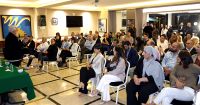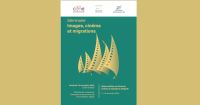What does the Japanese media have to say about the recent events in France? Do you want straight news, analysis or opinion editorials? The weeklies have got something for everyone.
Take the approach to taboo topics, for instance, as considered in Shukan Shincho (Jan. 22): “The notion that anything goes, as long as it doesn’t clash with the law, is not understood here in Japan,” an unnamed Japanese reporter says to pseudonymous columnist Yan Den Man. “If legal controls to restrain (content matter) are involved, it’s smarter to be proactive and decide on rules to follow beforehand. The Japan Newspaper Publishers and Editors Association has issued these kinds of standards in its ethical mission statement.”
The reporter is shown a particularly vulgar portrayal of the Prophet Muhammad from an earlier issue of Charlie Hebdo (forgive us, readers, for sparing you the details) and invited to comment.
“This?” he replies. “Well, I think it’s disgusting. I expect many French people also were repelled by it. . . . Just because the demonstrators on Jan. 11 held up signs reading ‘Je suis Charlie,’ doesn’t necessarily mean they approved of everything that was run in the magazine. At most, they were just criticizing terrorism.”
On the subject of the clash between religious beliefs and free speech, diplomat Masaki Kunieda sees parallels between the current problems in Europe and what Japan underwent in the 1990s.
“It resembles the problems with Aum Shinrikyo that previously occurred in Japan,” he tells Shukan Gendai (Jan. 31), referring to the doomsday cult behind the deadly gassing of the Tokyo subway and other attacks. “When people become psychologically unnerved, extremist views may arise that incite them to violence, by making them want to wreck what they perceive as the established order.”
Weekly Playboy (Feb. 2), concerned with what makes the Paris incident so disturbing, observes that up to now, acts of terrorism in Europe and other parts of the world had mainly involved random killings, such as by setting off explosives in places where many people had gathered. (This would include suicide bombings.) But the Charlie Hebdo incident represented a “new type” of terrorism that had focused on a specific target — a publisher. And the attack succeeded despite the presence of a police bodyguard.
A Japanese “contractor” with experience in anti-terrorism work, identified only by the name “A,” was quoted as saying: “They coldly executed a policeman with a single shot, and made their getaway by car. Their fighting skills were head-and-shoulders above the level of so-called HGTs (home-grown terrorists). Then while the authorities hunted the attackers, a second attacker killed a policewoman and then the following day killed four hostages at a Jewish market. This demonstrates they have the ability to launch dōji-tahatsu (simultaneous, multiple) acts of terrorism.
“I feel that terrorist techniques have moved to the next stage,” the contractor continues. “We’re calling these HGT-US, with the ‘U’ standing for ‘U-turn,’ in the sense that they go abroad for military training and then return to their home country. And the ‘S’ stands for ‘sleeper mode,’ in which several dozen groups are believed to have already infiltrated countries in Europe and North America.”
In the future he predicts that the HGT are likely to continue singling out soft (i.e. civilian) targets as opposed to police, the military or their facilities. One possible target, he speculates, would be France’s high-speed intercity train, the TGV.
Contractor A also appears familiar with world history. He notes that in the early 1920s, Italian Gen. Giulio Douhet (1869-1930) proposed theories of strategic bombing in aerial warfare that had a major influence on the conduct of World War II.
Douhet understood that victory was achieved by command of the air. He also believed in bombing’s effect on civilian morale. Because destroying a country’s “vital centers” would break people’s will, this tactic would ultimately render armies superfluous, because aircraft could overfly them to attack an enemy’s government and industry.
While al-Qaida and the Islamic State do not have the means to control the air to attack their enemy’s home front, they can make use of the Internet and LCC (low-cost carriers), i.e., ubiquitous communications and inexpensive transportation that gives them the capability to engage in strategic terrorism.
“The acts of terrorism in France should be seen as counterattacks against the European and U.S. air raids on IS and al-Qaida,” he explains.
But how does Japan fit into this equation? Aera (Jan. 26) echoed the fear that “Immigrants from Islamic countries might become ‘time bombs.’ “
According to a source in Japan’s Public Security Intelligence Agency, “The various (extremist groups) . . . are exchanging a wealth of bomb-making and publicity know-how, and the members lend out weapons or fighters to one another.”
This growing ability of extremist groups to network may empower them further. If so, then the Charlie Hebdo attack may be the opening volley in a protracted war.
“Among the countries that operate jointly with the U.S. military, such as Canada, Australia, the U.K. and France, anything might happen,” says Osamu Miyata, director of the Center for Contemporary Islamic Studies in Japan. “Japan is a military ally of the U.S. but has not been involved in killings in the Middle East, so it has yet to be targeted. But things have come to the point where it’s not somebody else’s problem any more.”
Aera is aware that in Japan as well, impassioned debates are occurring over which deserves priority: the freedom of expression or sensibilities toward the feelings of Muslims. “This year,” it concludes, “is fast becoming one in which each of us needs to ask how to engage with Islam.”
Shukan Bunshun (Jan. 22) recalls that back in 2002-2003, Japan’s security agency discovered that Lionel Dumont, a former French soldier believed to have ties to al-Qaida, had entered Japan, intending to organize a terrorist cell. Dumont was arrested and extradited to France, where he is currently serving a 25-year sentence for various robberies and other crimes.
“Foreign Affairs Section 3 had been newly set up to deal with international terrorism,” an unnamed government source tells the magazine. “To deal with this, the manpower was increased to 70 staff, and then again to 150. During the 2008 G-8 summit meeting at Lake Toya in Hokkaido, a staff of 220 and 20 cars were present. And mosques at seven locations in greater Tokyo were put on 24-hour surveillance. Anyone who met with Dumont was also subjected to close scrutiny.”
The Abe administration’s policy of opening up Japan to more blue-collar foreigners to deal with the labor pinch might be ill-advised, the magazine suggests.
“If you look at what’s been going on in the world, you don’t need to point just to France — all immigration policies have failed,” says France-based journalist Yuji Hirooka. “Mainly countries bring in immigrants for cheap labor because they don’t want to pay higher wages. It’s inevitable that such people wind up at the bottom of society. It’s possible any of them could wind up like the Kouachi brothers,” Hirooka says, referring to the men who attacked Charlie Hebdo.
Japan, Shukan Bunshun concludes, would be well advised not to “follow in the same wheel ruts” (i.e., repeat the same mistakes) as France.
The Japan Times





